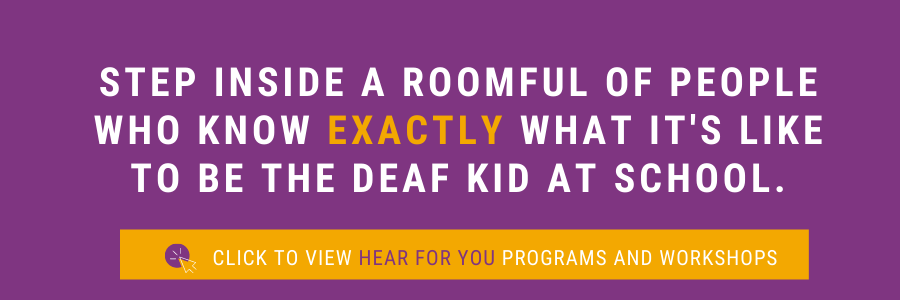When people think about hearing loss, they often don’t take into consideration the concept of listening fatigue. Hearing loss is much more than the difficulty in understanding speech and hearing capabilities. It’s important for individuals to understand that listening can be mentally and physically challenging and exhausting. It can zap a lot of energy for those who are deaf or hard of hearing.
Listening can be mentally and physically challenging and exhausting
A study conducted by the Danish Institute for Social Research discovered that 15 percent of those who are hard of hearing in the workforce are highly fatigued at the conclusion of their work day, leaving them no energy for leisurely activities and hobbies.
Head of Policy and Research at the National Deaf Children’s Society in the United Kingdom, Ian Noon, provides an accurate depiction of what listening fatigue is. He states,
“It’s about the energy involved in lip-reading and being attentive all day long. Processing and constructing meaning out of half-heard words and sentences. Making guesses and figuring out context. And then thinking of something intelligent to say in response to an invariably random question. It’s like doing jigsaws, Sudoku and Scrabble all at the same time.”
The loss of energy experienced due to hearing loss creates an extra difficulty to perform efficiently in a work environment or be engaged in other activities, or at home. The energy that could be otherwise used for leisurely activities or experiences is used throughout the day for listening as this requires more concentration and focus than a hearing person.
“It’s about the energy involved in lip-reading and being attentive all day long. Processing and constructing meaning out of half-heard words and sentences. Making guesses and figuring out context. And then thinking of something intelligent to say in response to an invariably random question. It’s like doing jigsaws, Sudoku and Scrabble all at the same time.” Ian Noon
How can listening make you tired and why?
There are three areas of the brain which connect with the auditory system to assist in sound interpretation and allow us to produce speech. These are:
- Broca’s Area: production of speech
- Wernicke’s Area: comprehension of speech
- Temporal Lobe: manages our hearing
For those who are hearing, these aspects of the brain act as a team and function without any difficulty. They communicate effortlessly. However, when you add hearing loss, the brain is forced to work and concentrate harder than usual and this sense of communication within the brain is disrupted and challenged which leads to the concept of listening fatigue.
Listening fatigue occurs when the brain is forced to work and concentrate harder than usual
How hearing aids can reduce listening fatigue
Hearing aids can assist in reducing the energy required for listening and communicating, as they allow those who are hard of hearing to hear sounds and speech across a variety of environments. The hearing aid assists in restoring sounds that are missed as a result of hearing loss, which allows the brain to use less energy to comprehend and understand these sounds.
More modern hearing aids are designed with features that reduce listening fatigue by assisting to amplify and focus on the sounds you would like to hear and reduce or remove any excess noise you don’t want to hear.
How can listening fatigue be reduced?
Hearing aids aren’t always perfect and can only reduce listening fatigue to a certain extent, but they do not prevent it from occurring. Below are some useful tips to assist in maintaining your energy levels and reduce listening fatigue throughout the day:
- Have a break from your hearing aids for 5-10 minutes a day. Turn them off and have some quiet time to allow your brain to rest.
- If you feel yourself becoming overly stressed or tired, take a deep breath and close your eyes for a moment to recuperate.
- Limit any disruptive noises or background noise that increase your hearing difficulties, even if you use hearing aids. (e.g. switch your phone to silent mode or remove yourself from any areas that have excess conversation or noises).
- Try reading a book, instead of watching television to give your ears a break and allow yourself to focus on other sounds and conversations more.
It’s important to take time for yourself and put you and your hearing needs first. Listening fatigue is real and it’s important to acknowledge that when you’re getting tired or running low on energy you need to take time out.
How can the community support those of us with hearing fatigue?
It’s important that as a community, in general, that we continually show our support to those who are deaf and/or hard of hearing, especially when it comes to listening fatigue. We can start by recognising that listening fatigue is:
- a real concept
- experienced on a daily basis by deaf and hard of hearing people
- exhausting, therefore more breaks may be required in meetings or social gatherings
- more manageable when coupled with other technology like captioning or transcripts when in meetings, or finding quieter places with less distracting noises when in social situations.
How can Hear For You help?
We know better than anyone what listening fatigue feels like. We encourage any deaf or hard of hearing teens aged between 12-18 years to reach out to one of our mentors to chat about any challenges they might be facing. You can check out our Mentors here, or even consider attending one of our Life Goals and Skills workshops and stay connected with other like-minded teens.




